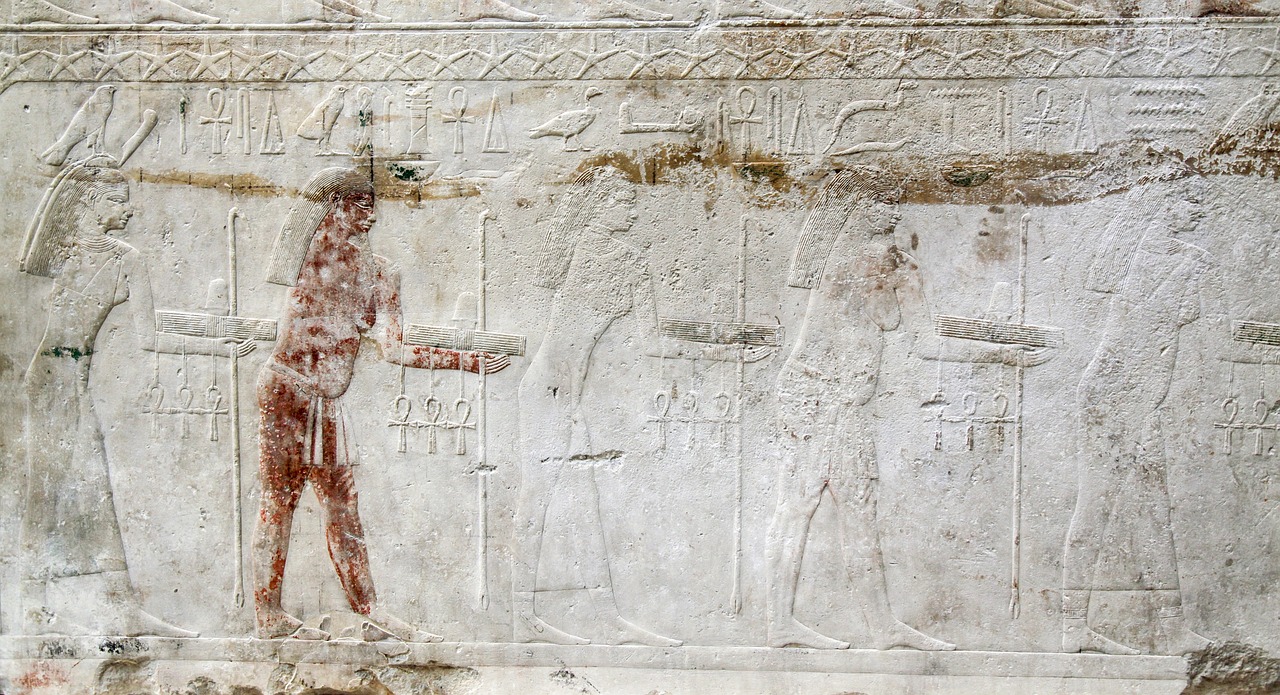The Role of Ancient Egyptian Women in Society
Exploring the historical significance and societal contributions of women in ancient Egypt reveals a rich tapestry of roles and responsibilities that women undertook in various facets of life. From family life to religious practices, political influence to economic contributions, and artistic expression to educational opportunities, ancient Egyptian women played a pivotal role in shaping the society of their time.
Within the family structure of ancient Egypt, women held essential roles as mothers, wives, and caretakers. They were the nurturing forces that maintained the harmony and stability of the household, imparting values and traditions to the next generation. Despite the patriarchal nature of society, women were revered for their wisdom and guidance within the family unit.
Religiously, women in ancient Egypt occupied significant positions as priestesses, worshippers, and active participants in religious ceremonies and rituals. They were seen as conduits to the divine, embodying spiritual purity and devotion in their worship practices. Women's influence in religious affairs was profound and respected.
While political power was primarily held by men, there were notable instances of women exerting influence in ancient Egyptian politics. Queens such as Cleopatra and Nefertiti wielded power alongside pharaohs, shaping policies and strategies that impacted the kingdom. Women also served as trusted advisors, offering counsel and guidance to rulers.
Women in ancient Egypt were not limited to domestic roles but actively participated in economic activities such as trade, agriculture, and craftwork. Their financial independence and entrepreneurial spirit were evident in their ability to engage in commerce and contribute to the economic prosperity of the society.
The artistic and cultural expressions of ancient Egyptian women were diverse and vibrant, encompassing music, dance, literature, and fashion. Their creativity and individuality shone through in their artistic endeavors, leaving a lasting legacy of beauty and innovation in Egyptian culture.
Despite societal norms, women in ancient Egypt had access to educational opportunities, including learning to read and write, engaging in intellectual discussions, and receiving specialized training in various fields. Their intellectual pursuits were encouraged and valued, contributing to the overall intellectual richness of the society.
Legal rights and social status of women in ancient Egyptian society were complex, with varying degrees of autonomy and restrictions depending on social class and marital status. Women had rights to own property, enter into contracts, and seek legal recourse in cases of injustice, reflecting a nuanced legal framework that recognized their agency.
The legacy of ancient Egyptian women endures in modern perceptions of gender roles, empowerment, and equality. Their contributions have inspired future generations to embrace their potential and capabilities, challenging traditional norms and paving the way for greater gender equality and social progress.

Family Life
Exploring the historical significance and societal contributions of women in ancient Egypt, shedding light on their roles in various aspects of life, including family, religion, politics, and culture.
Within ancient Egyptian society, women held pivotal roles in the family structure, serving as the nurturing heart of the household. As mothers, they were responsible for raising and educating children, imparting values and traditions that would shape future generations. Wives played a crucial role in maintaining harmony within the family unit, supporting their husbands in daily endeavors and decision-making. Additionally, women took on the role of caretakers, ensuring the well-being of family members and managing domestic affairs with grace and efficiency.
Moreover, women in ancient Egypt enjoyed a level of respect and influence within the family dynamic, with their opinions and counsel often sought in important matters. Their ability to balance multiple responsibilities while fostering a strong familial bond exemplified their strength and resilience.
Despite the patriarchal nature of ancient Egyptian society, women were valued for their contributions to the family unit and were regarded as essential pillars of stability and unity.

Religious Practices
Exploring the historical significance and societal contributions of women in ancient Egypt, shedding light on their roles in various aspects of life, including family, religion, politics, and culture.
Religion held a central place in ancient Egyptian society, and women played vital roles in religious practices. Women in ancient Egypt could serve as priestesses, leading ceremonies and offering prayers to the gods. They were seen as intermediaries between the people and the divine, with the ability to connect the earthly realm with the spiritual world. The priestesses were highly respected and held significant influence within religious institutions, guiding the community in matters of faith and spirituality.
Moreover, women actively participated in religious rituals and festivals, contributing to the spiritual life of the society. They engaged in sacred dances, music performances, and processions honoring the gods. Women's devotion and dedication to religious practices were evident in their active involvement in temple activities and their unwavering faith in the divine.
Additionally, women in ancient Egypt had the opportunity to make offerings and prayers to the gods, seeking blessings for themselves, their families, and the community. Their piety and reverence for the deities were demonstrated through their daily rituals and acts of worship, reinforcing the importance of spirituality in their lives.
Overall, the religious practices of ancient Egyptian women exemplified their deep connection to the divine, their commitment to upholding religious traditions, and their pivotal role in maintaining the spiritual harmony of the society.
Q: Were women allowed to become high-ranking priestesses in ancient Egypt?
A: Yes, women could attain high-ranking positions as priestesses in ancient Egyptian temples, where they played crucial roles in religious ceremonies and rituals.
Q: Did ancient Egyptian women have specific goddesses they worshipped?
A: Yes, ancient Egyptian women worshipped various goddesses such as Isis, Hathor, and Sekhmet, who symbolized different aspects of femininity, power, and protection.
Q: How did religious beliefs influence the daily lives of women in ancient Egypt?
A: Religious beliefs permeated every aspect of ancient Egyptian women's lives, guiding their moral values, social interactions, and personal conduct, shaping their identities as devout followers of the gods.

Political Influence
When delving into the political landscape of ancient Egypt, it becomes evident that women, although in limited numbers, held significant positions of power and influence. One of the most prominent examples is the role of queens, who not only served as consorts to pharaohs but also wielded substantial authority and influence in their own right. These powerful women, such as Cleopatra and Hatshepsut, navigated the complexities of political intrigue and governance, leaving a lasting mark on Egyptian history.
Moreover, women in ancient Egypt also served as advisors to pharaohs, offering counsel on matters of statecraft, diplomacy, and administration. Their wisdom and strategic acumen were highly valued, shaping the decisions and policies of the ruling elite. These female advisors played a crucial role in shaping the political landscape of the time, contributing to the stability and prosperity of the kingdom.
Furthermore, some women in ancient Egypt were known to actively participate in diplomatic affairs, representing the interests of the kingdom in negotiations with foreign powers. Their diplomatic skills and negotiation prowess were instrumental in securing alliances, trade agreements, and peace treaties, showcasing their diplomatic acumen and strategic foresight.
While the political sphere in ancient Egypt was predominantly male-dominated, the presence of influential women highlights the nuanced and dynamic nature of power dynamics in the ancient world. These remarkable women defied societal norms and expectations, carving out spaces for themselves in the political arena and leaving a lasting legacy of female empowerment and leadership.

Economic Contributions
Exploring the historical significance and societal contributions of women in ancient Egypt, shedding light on their roles in various aspects of life, including family, religion, politics, and culture.
In ancient Egypt, women played a crucial role in the economy, engaging in diverse economic activities that showcased their financial independence and entrepreneurial spirit. Women were actively involved in trade, managing their own businesses, and participating in agricultural work. The ancient Egyptian society recognized and valued the economic contributions of women, allowing them to thrive in various sectors of the economy.
Moreover, women in ancient Egypt were skilled craftswomen, creating intricate artifacts and textiles that were highly sought after both domestically and internationally. Their craftsmanship not only added to the cultural richness of ancient Egypt but also contributed significantly to the economy through trade and commerce.
Women's economic activities were not limited to traditional roles but also extended to innovative ventures, demonstrating their ability to adapt to changing market demands and explore new opportunities. The entrepreneurial spirit of ancient Egyptian women paved the way for future generations of women to excel in business and commerce, leaving a lasting legacy of economic empowerment.
Through their economic contributions, women in ancient Egypt not only supported their families and communities but also played a vital role in shaping the economic landscape of the civilization. Their resilience, creativity, and dedication to their craft continue to inspire modern perceptions of women in business and entrepreneurship.

Artistic and Cultural Expression
Exploring the historical significance and societal contributions of women in ancient Egypt, shedding light on their roles in various aspects of life, including family, religion, politics, and culture.
Women in ancient Egypt played a vital role in shaping the artistic and cultural landscape of their society. From music to literature, their creativity knew no bounds. Women were not only consumers but also creators of art, leaving a lasting impact on Egyptian culture.
One of the most notable forms of artistic expression by women in ancient Egypt was through music and dance. They were skilled musicians and dancers, often performing at religious ceremonies and social gatherings. Their graceful movements and melodious tunes captivated audiences and added a touch of elegance to the cultural scene.
Moreover, women in ancient Egypt excelled in literature, contributing to the rich tapestry of storytelling and poetry. They penned down tales of love, adventure, and mythology, showcasing their intellectual prowess and imaginative spirit. Their writings provided insights into the daily lives and beliefs of the Egyptian people, preserving their culture for future generations.
Additionally, women in ancient Egypt made significant contributions to fashion and style. They were known for their exquisite clothing, intricate jewelry, and elaborate hairstyles. Their sense of fashion not only reflected their social status but also served as a form of self-expression and identity. Through their unique fashion choices, women in ancient Egypt left a mark on the cultural heritage of the civilization.
Overall, the artistic and cultural expression of women in ancient Egypt was a testament to their creativity, individuality, and influence on the society's aesthetic values. Their contributions continue to inspire artists and cultural enthusiasts worldwide, showcasing the timeless legacy of Egyptian women in the realm of art and culture.
1. What were the primary artistic forms through which women expressed themselves in ancient Egypt?
2. How did women's contributions to literature impact ancient Egyptian society?
3. What role did music and dance play in the cultural practices of women in ancient Egypt?
4. How did women's fashion choices reflect their social status and identity in ancient Egypt?

Educational Opportunities
In ancient Egypt, women had access to a surprisingly diverse range of educational opportunities, considering the historical context. While formal schooling as we know it today did not exist, women were not excluded from intellectual pursuits. They had the chance to learn to read and write, which was a significant privilege in a society where literacy was not widespread. Women could participate in intellectual discussions, engage in philosophical debates, and receive specialized training in various fields.

